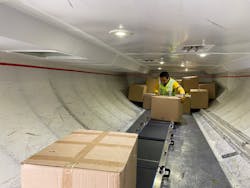As a former ramp service agent, Tim Fulton, CEO and founder of Ramper Innovations, knows the physical requirements needed for the job.
Because of this, he created the TISABAS, a baggage handling solution that utilizes a compact, motorized, folding conveyor system to assist with loading narrow-body aircraft.
“I saw far too many agents being injured or quitting because of the physical demands of the job of loading aircraft bellies. I had designed a product that worked great for commercial fish boxes but decided there had to be an affordable better way for all commodities,” says Fulton, who spent 38 years working on the ramp before working on the TISABAS – an abbreviation for (TI)m (SA)ves (BA)cks.
At the International GSE Expo in 2018, Ramper Innovations exhibited its proof of concept, which Fulton had made in his shop.
“We took what we learned to a conveyor engineering and manufacturing company. Through a couple of iterations, three units were delivered on March 15, 2020,” Fulton says.
However, Fulton says it has taken dedication and persistence to introduce his equipment to the GSE market.
Ramper Innovations had commitments from SpiceJet and Japan Aerospace Corporation (JAC) in Asia as well GAT Airline Ground Support, Menzies and Unifi in the USA to trial the TISABAS.
“We shipped a unit to India, but COVID stopped the beta test,” Fulton says. “We had the unit crated and ready to ship to Japan, and they canceled because of COVID. The beta test with GAT was delayed but finally proceeded with a unit to Sacramento in August 2020.”
Because of the complexities of the corporate airline structure, Fulton says he identified ground handling companies as potential customers. However, the airlines’ permission was still necessary to trial the TISABAS on their aircraft.
“To get the OK from airlines, we needed to first get the OK from Boeing and Airbus. We finally secured letters from both Boeing and Airbus and started back working with airlines,” he says.
Aeromexico was the first airline to give Ramper Innovations permission to proceed and a demo unit was deployed in July 2021. Viva Aerobus followed suit shortly after, along with Air Canada, Alaska Airlines, Swoop and Aerocharter de Mexico.
Aerocharter de Mexico has since purchased a TISABAS unit and has it in operations in Mexico City.
“We are still doing demos, and the majority of interest is with ground handling companies. But we do have demos scheduled with airlines,” Fulton says. “We are well received by ramp agents, managers and executives that have seen the product in use.”
According to Fulton, the compact, aluminum frame unit is easy to use and can fit into any operation without additional training. Able to convert power from the belt-loader, the TISABAS integrates with existing equipment.
Extended dimensions are 20 feet by 2 feet by 3 inches. Folded dimensions are 24 inches by 21 inches by 32 inches. The unit weighs 200 pounds and offers variable speeds.
It also works in all weather conditions, including heavy rain and temperatures ranging from -20 to 120 degrees F.
TISABAS has ergonomic and safety features built in, prevents damage to both aircraft and baggage and helps make operations more efficient, leading to fewer flight delays or cancelations.
“We have storage rack options and an easy way to bridge the gap for the on-load process,” Fulton adds, noting the unit is easy to move and proximity sensors provide additional safety benefits.
While the TISABAS offers a solution to manually loading aircraft, Fulton says it can be difficult to introduce a new idea to the market.
For the most part, our industry is not embracing change, and it is not startup-friendly,” he says. “Other industries embrace startups and new ideas by having venture capital divisions dedicated to identifying potential products and companies bringing change.
“I think it is getting better, but we still have a long way to go.”
About the Author
Josh Smith
Editor
Josh Smith served as editor of Ground Support Worldwide as editor from 2016 through 2024. He oversaw production of the print magazine, created GSW's newsletters on a daily basis, and updated the latest news on AviationPros.com.

